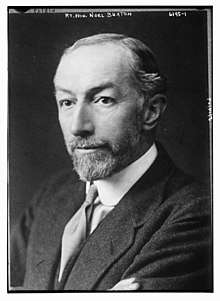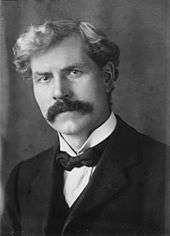Noel Buxton
Noel Edward Noel-Buxton, 1st Baron Noel-Buxton, PC (9 January 1869 – 12 September 1948) was a British Liberal and later Labour politician. He served as Minister of Agriculture and Fisheries under Ramsay MacDonald in 1924 and between 1929 and 1930.
The Lord Noel-Buxton PC | |
|---|---|
 | |
| Minister of Agriculture and Fisheries | |
| In office 22 January 1924 – 3 November 1924 | |
| Monarch | George V |
| Prime Minister | Ramsay MacDonald |
| Preceded by | Sir Robert Sanders, Bt |
| Succeeded by | Hon. E. F. L. Wood |
| In office 7 June 1929 – 5 June 1930 | |
| Monarch | George V |
| Prime Minister | Ramsay MacDonald |
| Preceded by | Hon. Walter Guinness |
| Succeeded by | Christopher Addison |
| Personal details | |
| Born | 9 January 1869 |
| Died | 12 September 1948 (aged 79) |
| Nationality | British |
| Political party | Liberal Labour |
| Spouse(s) | Lucy Burn (1888-1960) |
| Alma mater | Trinity College, Cambridge |
Background and education
Born Noel Edward Buxton, the second son of Sir Thomas Buxton, 3rd Baronet, he was educated at Harrow and at Trinity College, Cambridge.[1]
Political career
In 1896, Buxton acted as Aide-de-Camp to his father during his time as Governor of South Australia. He served on the Whitechapel Board of Guardians and Central Unemployment Body, and was a Member of the Home Office Departmental Committee on Lead Poisoning.[2]:42
Buxton stood unsuccessfully for Ipswich in 1900.[2]:31 He was elected as Liberal Member of Parliament for Whitby in 1905, a seat he held until 1906.[3] He was out of parliament until the January 1910 general election, when he was returned for Norfolk North.[4] He joined the Labour Party in 1919 and in 1922 he successfully contested his Norfolk North seat as a Labour candidate. He continued to represent the constituency until 1930.[4] When Labour came to power under Ramsay MacDonald in January 1924, Buxton was appointed Minister of Agriculture and Fisheries,[5] with a seat in the cabinet, and sworn of the Privy Council.[6] He remained as Minister of Agriculture and Fisheries until the government fell in December 1924. He resumed the post in 1929 (once again as a member of the cabinet) when Labour returned to office under MacDonald,[7] and held it until 1930, when he was raised to the peerage as Baron Noel-Buxton, of Aylsham in the County of Norfolk.[8] He changed his surname at this point to 'Noel-Buxton', so enabling that to be his title.[9]
Balkans
The Balkans became a very important part of Buxton's career. In 1912, as Buxton had been warning, war broke out between the newly independent Balkan countries of Bulgaria, Greece, Montenegro and Serbia and the Ottoman Empire. Buxton was Chairman of the Balkan War Relief Committee. Shortly after the war had broken out, he visited Bulgaria with Mabel St Clair Stobart, founder of the Women's Sick and Wounded Convoy Corps. He helped her convince the government to agree to send an all-female medical unit to the war.[10]
During the First World War (1914–1915), he went on a political mission with his brother, Charles Roden Buxton, with the object of securing the neutrality of Bulgaria. While in Bucharest, Romania in October 1914, an assassination attempt was made on them, by Turkish activist, Hasan Tahsin. Buxton was wounded and his brother was shot through the lung.[11]:74–75 They both recovered and continued to have an interest in the region.
After their return, they published a book describing the region and its recent history, The War and the Balkans (London: George Allen and Unwin, 1915). It begins with these words:
No one now denies the supreme importance of the Balkans as a factor in the European War. It may be that there were deep-seated hostilities between the Great Powers which would have, in any case, produced a European War and that if the Balkans had not offered the occasion, the occasion would have been found elsewhere. The fact remains that the Balkans did provide the occasion. A great part of the Serbo-Croat race found itself under the Austrian Empire, and with its increasing consciousness of nationality became more and more dissatisfied with its lot. The independent kingdom of Serbia for its part has taken active steps to spread abroad the idea of uniting its brothers under its own flag. It was Austria's ambition to crush this dangerous little State, the one rallying point of a vigorous and determined race.[12]
Buxton's publications include Europe and the Turks;[13] With the Bulgarian Staff;[14] Travels and Reflections, 1929; and he was part-author of The Heart of the Empire,[15] Travel and Politics in Armenia,[16] The War and the Balkans, Balkan Problems and European Peace,[17] and Oppressed Peoples and the League of Nations.[18]
Family
Noel was the great-grandson of the abolitionist, Sir Thomas Fowell Buxton he married Lucy Edith Pelham Burn in 1914.[2]:61 She succeeded him as Member of Parliament for Norfolk North in 1930.[19] The couple had six children.[20]
1. Noel Alexander Noel-Buxton later Rufus Alexander Buxton, later 2nd Baron Noel-Buxton
2. Lt Christopher Arthur Noel Noel-Buxton (b. 18 Feb 1918; d. 17 Sep 1940 following a riding accident)
3. Capt Michael Barnett Noel Noel-Buxton, served in World War II 1939-45 as Capt Royal Artillery and in Colonial Civil Service Gold Coast 1947-59 (b. 4 Jan 1920; d. 26 Jul 1995)
4. Lydia Victoria Noel Noel-Buxton (b. 4 Feb 1922; d. 10 Oct 1955)
5. Jane Elizabeth Noel Noel-Buxton (b. 22 May 1925; d. 21 Feb 2019)
6. Sarah Edith Noel Noel-Buxton (b. 23 Jan 1928), mar. 2 Jun 1955 John Goldsborough Hogg, of Old Broad Oak, Brenchley, co. Kent, 1st son of Francis Goldsborough Hogg, of Oddington, co. Gloucester, and has issue
Noel-Buxton died in September 1948, aged 79, and was succeeded in the barony by his eldest son, Rufus Alexander(1917-1980). Lady Noel-Buxton died in December 1960.
Noel Buxton Trust
Inspired by the abolitionism of his great-grandfather, he established the Noel Buxton Trust in 1919. This had a commitment to "a worldwide view of human welfare". The initial grant was made to the Fight the Famine Council, which was led by Eglantyne Jebb and his sister-in-law Dorothy Buxton which later became the Save the Children Fund. The charity is still functioning has recently funded the Family Rights Group, the Community Chaplaincy Association working with ex-prisoners, and Excellent, a charity supporting sustainable development with subsistence communities in Africa.[21]
References
- "Buxton [post Noel-Buxton], Noel Edward (BKSN886NE)". A Cambridge Alumni Database. University of Cambridge.
- Anderson, Mosa (1952). Noel Buxton: A Life. Allen & Unwin.
- leighrayment.com House of Commons: West Lothian to Widnes
- leighrayment.com House of Commons: New Romney to Northampton
- "No. 32901". The London Gazette. 25 January 1924. p. 770.
- "No. 32901". The London Gazette. 25 January 1924. p. 769.
- "No. 33505". The London Gazette. 11 June 1929. p. 3856.
- "No. 33617". The London Gazette. 20 June 1930. p. 3874.
- "No. 33614". The London Gazette. 10 June 1930. p. 3707.
- Shipton, Elisabeth (1 July 2014). Female Tommies: The Frontline Women of the First World War. The History Press. ISBN 9780750957489.
- Noel-Buxton, Noel Noel-Buxton Baron; Leese, Charles Leonard (1919). Balkan Problems and European Peace. G. Allen & Unwin. p. 75.
- Buxton, Noel; Buxton, Charles Roden (1915), The War and the Balkans (First ed.), London: George Allen & Unwin, p. 9, retrieved 25 January 2013
- Buxton, Noel (1907), Europe and the Turks (1 ed.), London: John Murray, retrieved 27 June 2016 – via Internet Archive
- Buxton, Noel (1913), With the Bulgarian Staff (1 ed.), New York: Macmillan, retrieved 27 June 2016 – via Internet Archive
- The Heart of the Empire : Discussions of Problems of Modern City Life in England with an Essay on Imperialism (1 ed.), London: T.Fisher Unwin, 1902, retrieved 27 June 2016 – via Internet Archive
- Buxton, Noel; Buxton, Rev. Harold (1914), Travel and Politics in Armenia, With An Introduction by Viscount Bryce (1 ed.), London: Macmillan, retrieved 27 June 2016 – via Internet Archive
- Buxton, Noel; Leese, C. Leonard (1919), Balkan Problems and European Peace (1 ed.), London: George Allen & Unwin Ltd., retrieved 27 June 2016 – via Internet Archive
- Buxton, Noel; Conwil-Evans, T.P. (1922), Oppressed Peoples and the League of Nations (1 ed.), London & Toronto: J.M. Dent & Sons Ltd., retrieved 27 June 2016 – via Internet Archive
- "No. 33625". The London Gazette. 15 July 1930. p. 4427.
- http://www.cracroftspeerage.co.uk/noelbuxton1930.htm
- "The Noel Buxton Trust Grant making since 1919". www.noelbuxtontrust.org.uk. Noel Buxton Trust. Retrieved 28 June 2019.
External links
- Hansard 1803–2005: contributions in Parliament by Noel Noel-Buxton
- Portraits of Noel Buxton at the National Portrait Gallery, London

| Parliament of the United Kingdom | ||
|---|---|---|
| Preceded by Ernest Beckett |
Member of Parliament for Whitby 1905–1906 |
Succeeded by Gervase Beckett |
| Preceded by Sir William Brampton Gurdon |
Member of Parliament for North Norfolk January 1910–1918 |
Succeeded by Douglas King |
| Preceded by Douglas King |
Member of Parliament for North Norfolk 1922–1930 |
Succeeded by The Baroness Noel-Buxton |
| Political offices | ||
| Preceded by Sir Robert Sanders, Bt |
Minister of Agriculture and Fisheries 1924 |
Succeeded by Hon. E. F. L. Wood |
| Preceded by Hon. Walter Guinness |
Minister of Agriculture and Fisheries 1929-30 |
Succeeded by Christopher Addison |
| Peerage of the United Kingdom | ||
| Preceded by (new creation) |
Baron Noel-Buxton 1930–1948 |
Succeeded by Rufus Alexander Buxton |
